Undergraduate
Student Profile: Cindy Meerim Kim
As a new psychology major at the UW, Cindy Kim found it surprisingly hard to make friends with her fellow students. While being part of one of the largest majors at the UW has its advantages, it can sometimes prove difficult to feel involved.
That problem didn’t last long for Cindy. During her sophomore year, Cindy joined the UW chapter of Psi Chi, the national honors society for psychology students. After spending a year as Psi Chi membership chair, she is now president of the UW chapter. “Psi Chi provided a way to meet great people and get involved in school activities,” says Cindy. This year’s Psi Chi sponsored activities included a Halloween Phobia Fest, a Float Your Stress Away event during finals week, and plans are in the works for a trip to the infant primate center, as well as organizing discussion groups for applying to graduate school.
This bright and energetic young woman definitely has the ability to multi-task. A recipient of both McNair and Mary Gates scholarships, Cindy is an honors student in psychology. Her research with Dr. Sybil Carrere has focussed on the different rate of sexual development of same-age, pre-pubertal girls and its relation to their family interaction. “The results of my research were thrilling and had unexpected social implications,” says Cindy.
While plans to apply to medical school are in her future, Cindy intends to take some time off to get to know herself a little better. These plans include travel around Asia and South America, as well as volunteer work at local health clinics. Clearly, even a “year off” won’t slow Cindy down. n
New Psychology Undergraduate Study Center Facilities
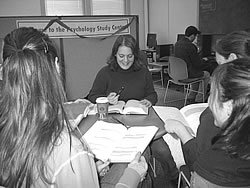 |
| Undergraduate Study Center |
The new Psychology Undergraduate Study Center, which opened in fall of 2004, is gaining popularity as a gathering place for psychology majors. Located across the street from Guthrie Hall, in Johnson Annex, the Study Center is dedicated exclusively to our undergraduate majors.
While providing an additional venue for students to meet with TAs, peer tutors, and study groups, the more casual atmosphere fosters a greater sense of community among psychology students. This sense of community, in turn, enhances students’ engagement with the Psychology Department. “Because we are one of the largest undergraduate majors in a very large university, we need to work deliberately toward creating a kind of ‘home base’ for our students,” says Academic Services Director Carrie Perrin.
Often, one of the most valuable learning tools is the opportunity for students to study with their peers--discussing assignments, working collaboratively, and sharing different perspectives.
Students can visit the Study Center at times convenient for their schedules.
Over the past year, a great deal of progress was made in creating a welcoming space for our psychology majors. The Center is now used for individual study, TA office hours, review and study sessions, Psi Chi meetings, and more casual events, such as “pizza lunch with the Chair.”
The Center provides a meeting space for the Department’s Preparing for Graduate School Support Group, monthly Transfer Advising Sessions, and Advising Office sponsored workshops, including: Study Abroad in the UK and Beyond, a Resume Workshop for Psychology Majors, and a CIA Employer Information Session.
The Study Center offers three computer workstations for student use, several small tables for studying, and a conference table for larger group meetings. Student, TA, and faculty response to the Study Center has been strong. “It’s been terrific to finally have a place to meet up with other psych majors,” said one senior, “it puts more of a ‘friendly face’ on the Department.” n
Student Profile: Libby Cope
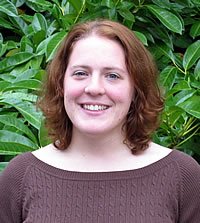 |
| Libby Cope |
This year’s undergraduate peer advisor for the Psychology Department is Libby Cope, a senior who is pursuing a double degree in psychology and public health. Libby’s experience at the UW is highlighted by her participation and leadership role in the Alternative Spring Quarter Experience. The quarter-long experience is an offshoot of the Alternative Spring Break program, which sends UW students to volunteer in rural Washington schools for one week.
While earning credit, a small group of UW students, including Libby, spent the entire spring quarter volunteering full time in a small tribal school on the Quileute Reservation on the Washington coast. Libby says that the exposure to a news environment and culture was similar to a study abroad experience. Upon returning to Seattle, Libby was offered the opportunity to organize and lead the next group of students for spring quarter 2005.
Libby is very enthusiastic about her work on the Quileute Reservation and encourages all students to pursue experiential learning opportunities, both off campus and outside of the Seattle area.
While her current position as Psychology Department peer advisor keeps her on campus, she has gained hands-on skills from which she will benefit as she moves on to graduate school and eventually to a counseling-related career.
Libby is also an undergraduate research assistant for Kimberly Balsam in psychology professor Jane Simoni’s lab. “I believe that experiential learning is critical to obtaining and applying the skills and knowledge expected of every UW graduate,” says Libby. “Being a college student is a great position for exploring the world through community service and internships and I hope every student takes advantage of this opportunity.” Great advice from the peer advisor! n
Cindy Johnson Roberts Living Her Dreams
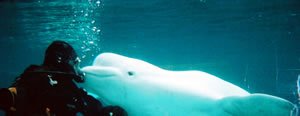 |
| Cindy Johnson Roberts |
People always ask how a psychology degree relates to working as an Aquarist,” says Cindy Roberts, “but it has been a great asset in so many ways.” Shortly after graduating with a Bachelor’s Degree in psychology from the UW, Cindy was hired as an Aquarist (zoo aquarium keeper), at Tacoma’s Point Defiance Zoo and Aquarium (PDZA). Cindy now spends her days diving in Puget Sound and in the aquariums at PDZA where she is responsible for the care of hundreds of species of fish and invertebrates.
Feeling as though she has found her “dream job,” Cindy thinks back to her time as a UW psychology major. “All the skills I took from my psych classes are imperative for my current position as an aquarist,” says Cindy. Among her favorite classes was the Human Performance Laboratory, which taught her about creating a research project from start to finish while helping her gain strong skills in scientific writing and public speaking. She is now confident in her ability to establish and execute research projects. Write scientific papers and present in front of zoo visitors or a room filled with colleagues. Cindy’s education in animal behavior has helped her to implement training programs using operant conditioning and to hone her observation skills.
Working full-time while attending the UW left Cindy precious little time to volunteer and gain experience in her chosen profession. Not one to give up her dreams, she faced her challenges with creativity and determination. Following her move to Washington, this Colorado native found her interest in working with animals turning towards marine species.
Initially intent upon becoming a marine mammal trainer, Cindy began volunteering at PDZA, working with beluga whales, walrus, sea otters and harbor seals. Cindy cautions that it wasn’t as glamorous as it might sound. “There was a lot of what I affectionately call poop scooping,” she remembers, “cleaning exhibits, scrubbing buckets, and working the cold and rain.” Her hard work and persistence eventually let to a part-time paid position where she gained the aquarium experience that was the final stepping stone towards her current position as an aquarist. Her initial passion for marine mammals led her in another direction, working with sharks, fish, octopus, and a variety of other marine species.
While growing up, Cindy never thought of herself as capable of going to college or becoming a “career girl.” It was her passion for animals, coupled with much soul searching and her sister’s encouragement, that set her on the pathway that led to the study of psychology and finally to her dream job. Setbacks and obstacles along the way were countered by the support of family, friends and professors. Cindy fondly remembers UW psychology professor Kim Barrett whose confidence in her as a student helped Cindy to see her potential. “Dr. Barrett was very supportive of my career goal and allowed me to do my psychology projects on subjects that were dear to my heart.”
Having gathered the tools to turn a lifelong love of animals into an exciting career, Cindy is now dedicated to her work with marine species, but also to educating others on how they can get involved in wildlife conservation efforts. On facing a sometimes bumpy road on the way to the fulfillment of a goal, Cindy thinks back on her own path. “Always keep an open mind,” she encourages, “embrace the adventures that you face and you might be surprised where you end up.”
Micah Alk and Skye Camphouse The Students Become the Teachers
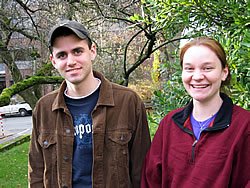 |
| Micah Alk and Skye Camphouse |
Coming to the UW as a transfer student can be overwhelming,” remembers psychology senior Skye Camphouse. Along with fellow psychology major Micah Alk, Skye is co-leading a Transfer Interest Group (TRIG) for first-quarter transfer students. Skye and Micah meet weekly with a group of 25 students who are preparing to apply to the psychology major. The TRIG students in Skye and Micah’s class receive an orientation to the UW and the Psychology Department, and benefit from the lessons learned by these seasoned psychology majors.
“I became a TRIG leader because it offers the very rare opportunity for undergraduate students to run their own class, “ says Skye, continuing that she wanted to share the knowledge she had gained to make other students’ transfer experiences go as smoothly as possible.
Co-instructor Micah shares Skye’s sentiments, but also saw the TRIG leader position as an opportunity to gain experience and practice in the teaching field. But, for Micah, a real positive has been the bond created with his students. “The best part about the TRIG experience,” says Micah, “has been connection with the transfer students in the class.” An added bonus for Micah has been the opportunity to share not only his experience, but also his sense of humor—and, he says, to occasionally get a laugh.
Both Micah and Skye are in the process of applying to graduate school in clinical or counseling psychology. Of their own experience in the Psychology Department, both Skye and Micah express great satisfaction not only with the academic program, but with the level and quality of support they have received from faculty and staff. “As a psychology major I never felt as though I was on my own,” says Skye.
Micah agrees, adding, “I have been consistently supported in my goals as well as given the opportunities to pursue them.” These two students have not only taken on the role of teacher, but have themselves become an integral part of the support system from which they benefited. n
Brandon Stogsdill Breaking Down Barriers
“I have never met a youth that was anything close to what I would consider ‘hopeless.’ By sharing my story and using my education and experience, I work to steer youth away from a self-defeating pathway. I try to let each youth I talk with understand that they are gifts that have been placed on this planet for a purpose, with all the necessary tools to achieve any dreams they desire.” - Brandon Stogsdill
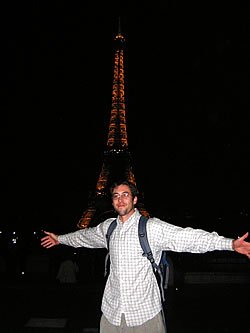 |
| Prandon Stogsdill |
Idealistic sentiments, you might say? Perhaps—but, take into account that they come from a young man who began his undergraduate education while serving time in prison. Brandon Stogsdill’s story, featured in last year’s Psychology Department Newsletter, is one of beating the odds, finding hope and a sense of purpose where there seemed to be none, and emerging from a world of violence and anger to find that dreams can be realized. Brandon’s is the story of breaking down barriers.
Checking in on Brandon’s progress over this past year, we find him continuing his community-based work with at-risk youth through the Chill and Impact programs, as well as adding to his already impressive list of awards and scholarships. Brandon, who arrived at the UW from Pierce Community College on a Martin Honors Scholarship, is now in his second year as a Mary Gates Leadership Scholar. Also the recipient of the S. Sterling Munro Fellowship, the George Newsome Humanitarian Award and an International Programs & Exchanges Scholarship to study in Paris, Brandon has just completed his application for the prestigious Truman Scholarship. This past year has also included numerous presentations and speaking engagements, as well as the completion of a book about his
experiences, which is now in the hands of a literary agent. Brandon is also poised to apply for a $40,000 grant for the initiations and expansion of The Real Experience project; a diversion program designed to work with at-risk youth,
which he developed while incarcerated Now, nearly halfway through his senior year as a psychology major, with a trail of accomplishments behind him and a bright future ahead, Brandon is reflective. He’s thinking about the young people he has met whose cries for help—whether in the form of a scream or a whisper—have touched him. “My gift is being able to uncover the mask, break down the barrier, and decipher the message that is coming through their scream or whisper.” Travelling the path with Brandon, the road sign ahead reads “Watch for Falling Barriers.” n
Undergraduate Accomplishments
2004-2005 Scholars and Grant Recipients Among Psychchology Undergraduates
S. Sterling Munro Public Service Fellowship:
Brandon Stogsdill Worked with IMPACT and Burton Snowboard Chill Program serving under-privileged youth
Ronald E. McNair Scholarship:
Cindy Kim Researched the effects of stress on the onset of puberty
Thuy Doan N. Tran Worked as a research assistant studying person perception and motivation
Mary Gates Research Scholarships:
Kelly Bui Studied inverse relationship between alcohol use and negative affects
Elizabeth Cope Researched stress and coping within the LGBTQ population
Derek Dauphin Studied source of gender differences in infant imitation
Cindy Kim Family Health Project; studied marital and family communications
Avriel Linane Studied the genetic diagnosis of IPEX, a hereditary pediatric immune disease
Jennifer Mallory Effects of aggression in kindergarteners and their attachment relationship
Misa Odagiri Did behavioral assessment of macaque monkeys at UW and in Indonesia
Jonathan Sabo Investigated effects of chronic construal levels on persistence and success in challenging tasks
Adrianne Stevens Studied the role of perfectionism and anger expression in adolescent self-harm behavior
Laurel Stevens Did isolation and characterization of Plymyxin resistant mutants of Pseudomonas aeruginosa
Chelsea Whitney Interviewed women who were both queer and disabled to investigate identity development processes
Mary Gates Leadership Scholarships:
Jaime Biava Worked with Tourette Syndrome Association Board of Directors and the Tourette Syndrome Summer Camp
Susan Kennedy Mentored new climbing students
More Undergrad Kudos
Emily Wood was selected as a Mary Gates Scholar. She works with Sheri Mizumori on the role of dopamine in context processing.
Derek Dauphin was awarded a research training grant from the Mary Gates Endowment for Students.
Brandon Stogsdill was recently awarded an S. Sterling Munro Public Service Fellowship.
Congratulations to Winnie Chan and Joy Hackenbracht, co-winners of the 2005 Edwin R. Guthrie Prize in Psychology.

